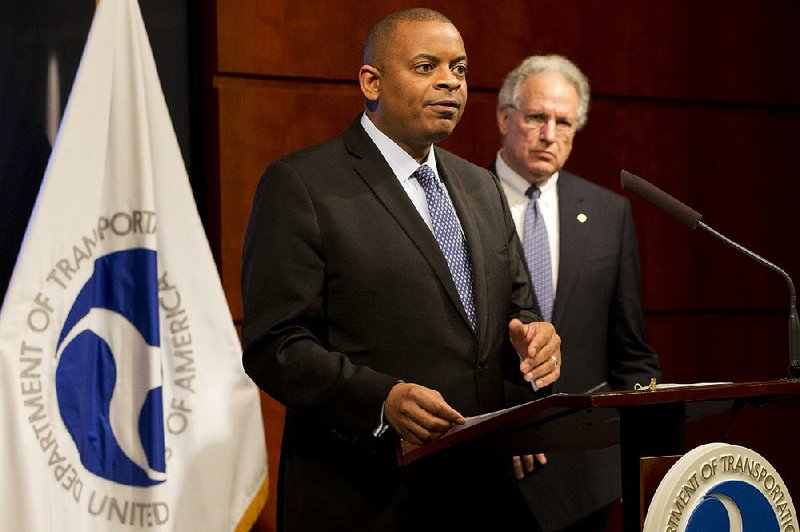Air-bag maker Takata Corp. gave in to U.S. regulators on Tuesday, agreeing to what will be the largest automotive recall in history as investigators continue to search for the root cause of a defect that has killed at least six people.
About 34 million cars are now on a list for air-bag replacements, almost double the number that had already been recalled. With vehicles from 11 automakers and a shortage of repair parts, it could take years for all the cars to be made safe, said Mark Rosekind, the head of the National Highway Traffic Safety Administration.
"As far as we know, this is the largest recall in auto history," Rosekind said at a news conference in Washington. "Others are doing research and suggest that it could be one of the largest, if not the largest of all, of consumer recalls."
As part of a consent order, Tokyo-based Takata agreed to make the recall nationwide -- a step it had resisted -- and submit its air-bag parts to the U.S. government for testing. The agreement offers a way for Takata to resolve a global auto-safety crisis that made it a target for lawsuits and hurt the company's standing with the automakers it supplies.
"We are pleased to have reached this agreement with [the National Highway Traffic Safety Administration], which presents a clear path forward to advancing safety and restoring the trust of automakers and the driving public," Takata Chief Executive Officer Shigehisa Takada said in a statement.
Asked whether Takata has agreed to penalties, Rosekind said more than $1 million in fines have accumulated so far, and more were ahead depending on the investigation.
"They are suspended right now until we see what the going forward plan is," Rosekind said.
The case involves air-bag inflators that may have been degraded by moisture, causing them to deploy with too much force in a crash, breaking apart and sending shards of metal and plastic into vehicle passenger compartments.
As part of the consent order, Takata released four defect reports, spelling out safety hazards in various sets of vehicles. The company gives different estimates on how long replacement inflators may last in different kinds of climates, including the high-humidity states that were the focus of the early recalls.
The National Highway Traffic Safety Administration couldn't provide a precise timetable on when repairs would be complete because of the complexity of coordinating with so many automakers. Because the root cause of the defect still isn't known, it's uncertain that replacement air bags will last the entire life of the vehicles and it's possible consumers will need a second repair in several years, Rosekind said.
"We know that the ones that are going in are safer," Rosekind said. "The concern is, are they safe over the long term? That has yet to be determined."
Older vehicles and those in high-humidity states would get the highest priority in rolling out repairs, Takata said in its statement.
Sen. Richard Blumenthal, a member of a Senate panel that governs transportation policy, has been pushing for a criminal investigation into Takata's handling of the recalls.
"Takata should have been much more aggressive before now in protecting passengers through a national recall," said Blumenthal, D-Conn. "In the meantime the Department of Justice should be taking appropriate action to investigate and impose penalties."
Takata shares fell 1.1 percent to $12.49 in Tokyo trading before the announcement was made in the U.S. The stock has lost 27 percent in the past year, compared with a 42 percent gain by Japan's benchmark Topix index.
The National Highway Traffic Safety Administration has been pressuring Honda Motor Co., Nissan Motor Co. and at least eight other automakers affected by the recalls to speed up the repair process and work with other air-bag suppliers to obtain parts. The agency also has demanded that Takata turn over more documents and data from the devices that have been removed from the recalled cars.
The safety administration in February began fining Takata $14,000 a day for not completely answering questions about air-bag inflator production and company efforts to investigate the explosions. It said at the time that most of the 2.4 million pages of documents the company had produced didn't actually relate to the agency's specific inquiries.
The consent order puts the safety administration's relationship with Takata on a new footing. While the potential for more fines is there as the formal investigation continues, the company and the regulator are now cooperating on testing, evaluating potential fixes and coordinating repairs with automakers.
The agency become more aggressive since it was lambasted by Congress for failing to be more active before last year's revelation that about 2.6 million General Motors Co. cars had a known ignition-switch defect that went unrecalled for years.
"[The National Highway Traffic Safety Administration] has done a 180-degree turn on how they're handling these safety investigations," Kevin Dean, who represents plaintiffs in several air-bag lawsuits, said, praising the agency. The recalls still may not go far enough, he said.
Modern air bags, credited by the safety administration with saving more than 2,000 lives per year in the U.S., rely on chemical reactions to safely inflate in milliseconds when sensors detect a crash. Takata's trouble has been linked by safety advocates and victims' lawyers to the company's choice of chemical propellant, a type of ammonium nitrate that can be rendered unstable by high humidity and moisture.
In a properly operating device, gas created by an electrical charge is released through holes in a metal canister to inflate the air bag. If the chemical propellant tablets are made improperly or have degraded because of moisture, they vaporize with too much pressure, potentially resulting in a burst canister that hurls metal and plastic shards.
"All of us have to do fact-checking to make sure they're getting every vehicle with ammonium nitrate-based inflators, because they're subject to deterioration over time," Dean said.
One of the main disputes between Takata and the safety administration had been over whether to initiate a national recall for some driver's-side air bags. The company had said the defect was tied to high humidity, and it supported recalls limited to Southern U.S. states with tropical weather. Tuesday's agreement makes all the air-bag recalls national.
In addition to Honda and Nissan, Takata's other affected customers in the U.S. market are units of Fiat Chrysler Automobiles NV, Toyota Motor Corp., Bayerische Motoren Werke AG, Mazda Motor Corp., Ford Motor Co., General Motors, Fuji Heavy Industries Ltd.'s Subaru and Mitsubishi Motors Corp.
Information for this article was contributed by Jeff Green, Chris Strohm and Margaret Cronin Fisk of Bloomberg News.
Business on 05/20/2015

